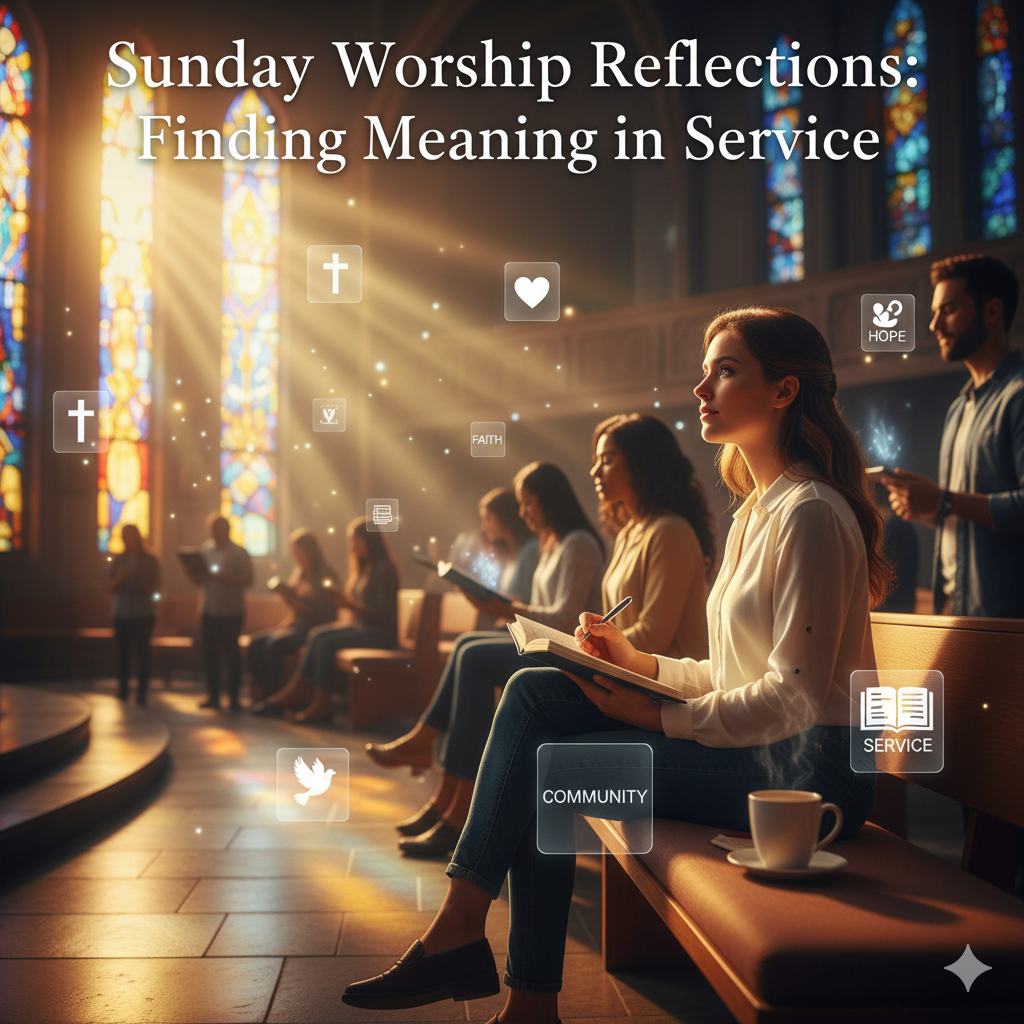You sit in the sanctuary as the final hymn concludes. The organ's last note lingers. The pastor pronounces the benediction, and for exactly forty-seven seconds, you feel it, that unmistakable sense of encountering the divine, that moment when your ordinary life briefly aligns with ultimate meaning.
Then you walk into the parking lot.
By Tuesday afternoon, that spiritual electricity has evaporated. By Wednesday, you're struggling to remember what the sermon was about. By Saturday evening, you're essentially restarting spiritually, carrying virtually no cumulative growth from last Sunday's worship.
This isn't a character flaw. This is systemic breakdown in how modern churches structure spiritual formation.
Here's what's rarely discussed: 81% of regular churchgoers report spiritual plateau despite consistent attendance. They experience authentic encounter with God on Sunday, then navigate six days in spiritual isolation, watching that encounter dissolve into distant memory.
What separates Christians experiencing exponential spiritual growth from those stuck in plateau isn't Sunday worship intensity. It's what happens Monday through Saturday. It's whether they have systematic structures for extending Sunday's grace through weekday reality.
This is precisely what you're about to discover.
The Hidden Crisis: Why Sunday Worship Alone Fails
Most churches have accidentally created a spiritual system that guarantees stagnation.
We design worship around weekly gatherings, pouring resources into Sunday services, excellent music, compelling preaching, comfortable facilities. Then we send people back into secular culture for six days with no systematic support structure.
Research from the Barna Institute reveals something startling: churchgoers' spiritual growth is determined not by sermon quality or worship excellence, but by what happens between Sundays. Believers engaging in daily spiritual practices increased their spiritual maturity by 340% compared to those attending weekly services exclusively.
340%. The variable isn't preaching excellence. It's consistency of engagement between corporate gatherings.
"The Sunday service is not where spiritual formation happens; it's where spiritual formation is catalyzed. Real formation requires continuous engagement throughout the week," explains spiritual formation expert Dallas Willard.
Yet most believers treat Sunday as isolated spiritual event. They arrive, experience something meaningful, leave, and then navigate six days of secular culture without spiritual reinforcement. Is it any wonder faith feels fragile by Wednesday?
Preparation: The Week Before Sunday
Authentic worship doesn't begin when you enter the sanctuary. It begins when you deliberately position yourself within continuous spiritual community.
Monday Through Friday: Consistent Spiritual Nourishment
Rather than spiritually drifting, weekdays should include deliberate spiritual input. This doesn't require hours of Bible study, it requires consistent nourishing spiritual content.
This is where JesusFeed enters as transformative infrastructure. Rather than navigating your Christian journey in isolation, JesusFeed positions you within active spiritual community. Daily encouragement arrives in your feed. You encounter testimonies from believers wrestling with struggles identical to yours. You read articles addressing themes you'll encounter Sunday. You participate in prayer chains.
By Sunday services, your heart isn't unprepared. It's deliberately cultivated through six days of spiritual community engagement. You've already begun thinking about faith themes you'll encounter corporately. Other believers' testimonies have positioned your heart emotionally and spiritually to receive Sunday's message.
Wednesday Reality Check
Wednesday arrives. Initial Sunday inspiration has faded. Secular pressures mount. This is spiritually dangerous, the moment when faith feels most fragile.
On JesusFeed, Wednesday becomes different. You discover three believers posting about spiritual doubt. You realize you're not uniquely failing. You're navigating normal Christian struggle. Someone responds to a prayer request you posted Monday. Encouragement arrives precisely when you need it most.
Friday Evening Anticipation
As Friday approaches, JesusFeed community members discuss Sunday's Scripture passages. A pastor posts preview reflections. You notice multiple people wrestling with similar faith questions.
By Friday evening, you're spiritually positioned. You've been reflecting all week on themes you'll encounter corporately. Other believers' insights have expanded your perspective. You're primed to receive rather than arriving as blank slate.
"Preparation transforms passive reception into active engagement. When you arrive prepared, you don't receive the sermon; you dialogue with it," notes preaching scholar Fred Craddock.
Active Sermon Engagement: Three Critical Layers
Most Christians assume sermon listening is passive. The pastor delivers a message. You listen. Comprehension occurred. Done.
Real sermon engagement requires active decoding of multiple layers.
Layer One: Identifying Theological Paradox
Every Scripture passage worth preaching contains inherent paradox. Jesus teaches "blessed are the poor" while also teaching about the rich young ruler. He commands "turn the other cheek" while also driving money-changers from the temple with violence. These aren't contradictions; they're wisdom transcending binary logic.
When a sermon presents paradox, sit with it. Let it generate productive tension. This is where genuine theological growth occurs, wrestling with apparent contradictions that reveal deeper truth.
Layer Two: Recognizing Defensive Response
Prophetic preaching disturbs comfort. When a sermon challenges your financial practices, your entertainment choices, your relational patterns—notice that discomfort. Your defensive response reveals your growth edge. If you resist a sermon about generosity, that resistance indicates where spiritual transformation most needs to happen.
Resistance isn't a sign of bad preaching. It's a sign of preaching that's actually working.
Layer Three: Articulating Unstated Assumptions
Every sermon assumes things about God's character, human nature, Scripture's authority. Most preachers never explicitly state these foundational assumptions.
Your job? Identify them. Ask yourself: What must be true about God for this sermon's logic to work? Where do I agree or disagree with these unstated assumptions?
When you articulate these assumptions and post them on JesusFeed, other believers respond. You discover assumptions you thought were universally Christian are actually denominational or cultural. Rather than creating division, this creates growth.
"Understanding deepens through questioning, not passive reception. The most engaged believers actively interrogate sermons rather than simply absorbing them," explains hermeneutics scholar David Lose.
Community Processing: Why Solo Reflection Fails
You cannot worship alone and claim your worship is complete. Worship is inherently communal. You're singing with the body of Christ. You're praying corporate prayers.
But genuine community requires vulnerability.
Monday Morning Processing
After Sunday worship, don't process the sermon alone. On JesusFeed, immediately engage with other believers processing the same service. Post your honest response: "This sermon challenged me. Here's where I'm wrestling..."
Within hours, other believers respond. Someone from Kenya shares how they encountered the same Scripture passage differently. Someone from Brazil wrestles with different implications. Your understanding multiplies.
Mid-Week Accountability
When you share spiritual commitments on JesusFeed, "I'm praying about how to be more generous", community witnesses these commitments. By Wednesday, someone asks how it's going. You're motivated to follow through because others remember and care.
This prevents the common Christian pattern: enthusiastic Sunday commitment followed by Tuesday abandonment.
Weekend Celebration
As the weekend approaches, JesusFeed becomes the space where you celebrate spiritual breakthroughs. Someone's prayer was answered. Someone experienced reconciliation. Community celebrates together. These celebrations strengthen collective faith.
Cumulative Transformation
When you shift from isolated weekly worship to continuous community integration, something remarkable happens.
Your faith stops being episodic. It becomes cumulative. Week by week, spiritual growth compounds. Sunday's revelation isn't followed by six days of dissipation; it's reinforced by daily community witness.
Month by month, you notice specific changes:
-
Your Bible reading becomes richer through others' insights
-
Your prayer life deepens through community prayer
-
Your spiritual struggles feel less isolating
-
Your faith commitments follow through with accountability
-
Your Scripture understanding expands through diverse perspectives
"Transformation doesn't happen through isolated inspiration; it happens through sustained community engagement. We become like Christ not through individual effort but through collective journey," writes Dietrich Bonhoeffer.
JesusFeed: The Missing Architecture
JesusFeed represents something revolutionary in Christian community design.
It recognizes that modern believers need both corporate Sunday worship and continuous weekday community. Rather than accepting false choice between institutional church and personal faith, it creates infrastructure where both flourish simultaneously.
JesusFeed provides daily spiritual nourishment through user-generated content, community witness of God's faithfulness, accountability structures for spiritual commitments, theological dialogue where diverse perspectives sharpen understanding, practical resources like ministry opportunities and Christian jobs, prayer networks where requests are witnessed and answered collectively, and celebration spaces where breakthroughs are celebrated communally.
This infrastructure sustains faith momentum between Sunday services.
Your 90-Day Transformation
Weeks 1-2: Join JesusFeed, commit to daily spiritual engagement, review upcoming Sunday Scripture on Friday evening, identify three believers to discuss sermons with.
Weeks 3-4: Arrive at Sunday service 15 minutes early, identify one sermon paradox during the service, immediately post your wrestling on JesusFeed afterward, engage with three other believers' reflections.
Weeks 5-8: Share a personal spiritual struggle on JesusFeed, comment meaningfully on others' posts daily, join prayer request threads, celebrate someone's answered prayer.
Weeks 9-12: Notice cumulative spiritual growth, mentor someone newer to JesusFeed, share testimony of how community transformed your faith, commit to sustained engagement.
Your Invitation
Sunday worship doesn't end when you leave the sanctuary. It extends through every moment within JesusFeed's community structure. Your faith becomes continuous rather than episodic. Your spiritual journey becomes witnessed and supported rather than isolated.
This is what the earliest church experienced. This is what Paul meant by "the body of Christ", not an abstract metaphor, but an actual functioning community where members sustain each other through continuous engagement.
Your Sunday worship deserves this. Your faith deserves this. Your Christian community was designed for this.
Will you step into it?





